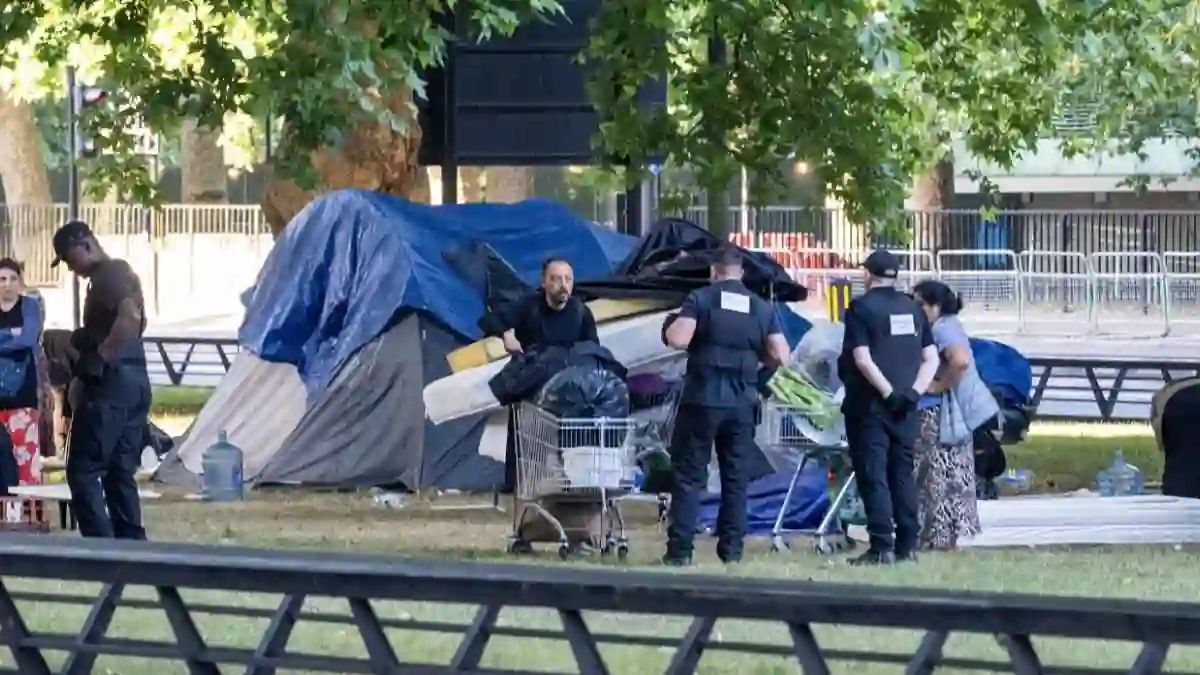It was just after sunrise on a quiet Thursday when the well-heeled calm of Park Lane in central London was abruptly shattered.
Not by luxury cars or tourist chatter—but by dozens of bailiffs clearing out yet another makeshift migrant camp from one of the city’s most exclusive postcodes.
What had become a patchwork of tents, washing lines, and street-side gambling spots vanished in a matter of hours.
Thirty or so migrants gathered their belongings, loaded them into shopping trolleys, and quietly wheeled them toward Marble Arch, while tourists on open-top buses looked on in disbelief.
A Brutal Killing in Broad Daylight
Just days before, a far more chilling event unfolded nearby in Knightsbridge.
Blue Stevens, a 24-year-old father visiting from Hampshire, was fatally stabbed outside the pricey Nusr-Et Steakhouse—where a single steak can cost over £600.
According to reports, a masked assailant on a bike targeted him—possibly for his watch.
When Blue resisted, he was stabbed in the chest as his partner, Tayla, screamed for help. He died right there on the pavement.
In the middle of the day. In front of passersby. In one of the most expensive areas of the city.
The Capital Feels Unfamiliar
If this sounds like a different London—it’s because it is. Crime is spiking.
Glitzy areas once considered safe havens for the elite are seeing a rise in violent robberies, carried out by organized gangs nicknamed the “Rolex Rippers,” who snatch luxury watches, jewelry, and handbags without warning.
Add to that a growing number of shuttered restaurants, a declining property market, and an increasing sense of lawlessness—and the portrait of modern London is far from flattering.
The Rich Are Quietly Packing Their Bags
And the wealthy? They’re leaving. In fact, they’re leaving in droves.
According to a global wealth migration report, the UK lost 9,500 millionaires in 2024 alone—more than any other country except Russia.
Many of these individuals, known as non-doms, are ditching London’s Belgravia, Mayfair, and Knightsbridge in favor of cities like Dubai, Geneva, Milan, and Lisbon.
Why? It’s not just the rise in crime. It’s Labour’s new inheritance tax rules, which for the first time target non-doms’ global assets—not just their UK holdings—after ten years of residence. A 40% tax on everything.
The Tax That Sent Wealth Fleeing
“This policy makes no sense,” says Trevor Abrahamson of Glentree Estates.
“They will pay tax—but not on everything they’ve ever owned worldwide.”
Some of his top clients, including billionaire Lakshmi Mittal and shipping tycoon John Fredriksen, have already relocated to Dubai.
These aren’t just high earners—they’re spenders. The kind of people who prop up London’s luxury economy by buying multi-million-pound homes, dining at upscale restaurants, and keeping boutique stores alive.
Their sudden absence is being felt everywhere.
Once-Buzzing Streets Now Stand Still
In Belgravia’s Eaton Square, usually a quiet but elegant area, streets now look deserted.
Dozens of homes sit empty, blinds drawn, curtains closed—even in summer.
The only signs of life? A few cleaners, builders, and car valets polishing spotless vehicles “just in case” their owners jet in for a weekend visit.
The same goes for Chester Square, Montpelier Square, and Kensington—where many properties are on the market with little buyer interest.
Even Mayfair, once a high-demand haven, is seeing home prices drop by up to 26%.
But few sales are closing, as most owners are wealthy enough to hold out indefinitely.
Properties Are Empty, But No One’s Selling
Jo Eccles, managing director of consultancy firm Eccord, says many of the ultra-rich don’t need to sell at all.
“They’re wealthy enough to be patient,” she explains.
“They’ll just sit on their properties until the climate improves.”
Camilla Dell of Black Brick confirms the same. Her firm manages homes that are now largely empty.
“It’s the fastest-growing part of my business,” she says.
“London used to be a place where the wealthy wanted to live. That’s no longer the case.”
A Slow Decline That’s Been Years in the Making
None of this happened overnight. The departure of wealthy residents has been building steadily since the 2008 financial crash, Brexit uncertainty, and ongoing changes to tax rules.
After Russia invaded Ukraine in 2022, London’s elite Russian community disappeared almost instantly.
Now, safety is a growing concern, even for the super-rich.
“You have to be much more streetwise than before,” says Eccles.
“You don’t wear a big watch in London anymore.
Many of my clients now travel with private security.”
Restaurants and Retailers Are Feeling It Too
It’s not just the real estate market that’s suffering.
The hospitality industry is also feeling the loss.
Once-bustling luxury restaurants now stand half-empty.
At places like the Dorchester or Langan’s Brasserie, tables are readily available—and often vacant.
One diner at the Mandarin Oriental’s £170-a-head tasting menu said their party was the only table served during an entire evening.
And outside the posh Mayfair hotels? Migrant camps had recently been pitched on the pavement.
London’s Luxe Appeal Is Fading Fast
Even the high-end shopping experience feels hollow.
Once-glamorous boutiques like Oscar de la Renta, Jimmy Choo, and Balmain are frequently empty.
At Lanvin, the doorman barely moves. At the Bentley showroom in Berkeley Square, staff lounge at the counter with little to do.
All of this is a far cry from the London of the past few decades, which welcomed the wealthy from across the globe—from Greek shipping magnates to Middle Eastern royals—with financial stability, green parks, and five-star service.
What’s Next for a Diminished Capital?
Of course, some wealthy buyers remain. Property experts say lower prices might finally lure more domestic buyers back into the city’s most expensive neighborhoods.
And with Trump’s re-election in the U.S., more Americans are moving to areas like Notting Hill and St. John’s Wood.
But even they are arriving to a city that feels emptier, less secure, and uncertain about its identity.
A city where luxury sits beside homelessness. Where empty mansions line the streets.
And where, on a Wednesday afternoon, a young man can be stabbed to death outside a steakhouse with gold-plated knives.
This is London today. Still iconic—but undeniably fraying at the seams.



